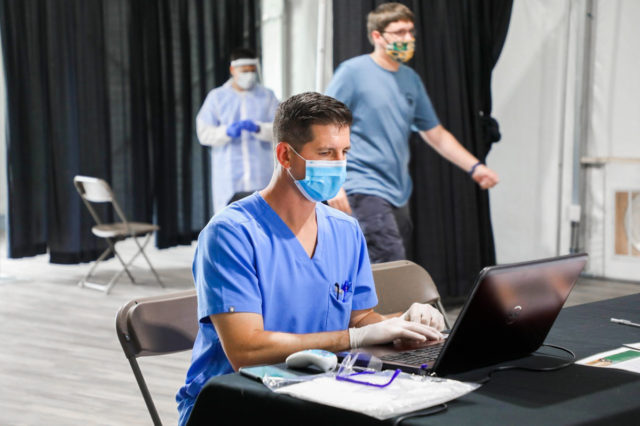By Camille Rasor | News Editor, Emily Cousins | Staff Writer
Baylor President Dr. Linda Livingstone announced mandatory weekly COVID-19 tests will be administered to all students, faculty and staff throughout the semester in an email sent out to the Baylor community today.
“We will have several testing locations available across the campus, and the tests will be self-administered,” Livingstone wrote in the email.
Baylor Medical Director Dr. Sharon Stern said self-administered tests will be less uncomfortable.
“There have been several studies that show that self-administered tests, if monitored by clinical personnel, are as accurate as lab tech administered tests,” Stern said.
Baylor representative Lori Fogleman said Baylor uses the a polymerase chain reaction test, which is the “gold standard” for COVID-19 testing.
These tests will be required in addition to the negative COVID-19 test required for students to return to Waco. Additionally, it was announced that Baylor has received 300 doses of the Moderna vaccine and are being distributed to individuals in the Phase 1A group of Texas vaccine recipients.
“We are developing plans for Phase 1B, provided we obtain additional doses, which will include people 65 years of age or older or people 16 years of age and older with at least one chronic medical condition that places them at increased risk for severe illness,” Livingstone wrote. “We will provide additional information as it becomes available.”
Stern said Baylor applied to be a vaccine provider at the State Department of Health Services. The State Department of Health Services will decide how many doses to send to Baylor based on need, their supply, provider population and storage capacity.
“The State Department of Health Services asks a number of questions, including total patient population, how many in various risk groups; health workers, over 65, disabled, etc.,” Stern said. “They also ask about storage capacity as the vaccines need to be stored in a freezer or ultra-low freezer or refrigerator … They then inform us when they will send us which vaccine and how much. We cannot order it and we do not know what we will get or when we will get more — other than the second doses. Those are guaranteed to arrive at the appropriate time for the patients already vaccinated.”
As a new strain of the virus spreads, Fogleman said they will continue to push for the protocols already in place.
“Facemasks and proper social distancing will again be required on campus for the semester,” Livingstone wrote. “These are important safeguards at this critical stage of the pandemic, as well as to help us reduce the spread of the common flu at the same time. In accordance with new CDC guidance, we have reduced the length of quarantine for exposed individuals from 14 days to 10 days, which aligns with the isolation timeframe.”
Stern said the Health Management Team is working constantly to keep everyone safe.
“We plan to continue to emphasize the importance of social distancing, mask wearing and hand washing,” Stern said. “We also will be doing more frequent surveillance testing to try to control spread from asymptomatic people. We also are hoping to be able to receive enough vaccines to immunize everyone soon.”



